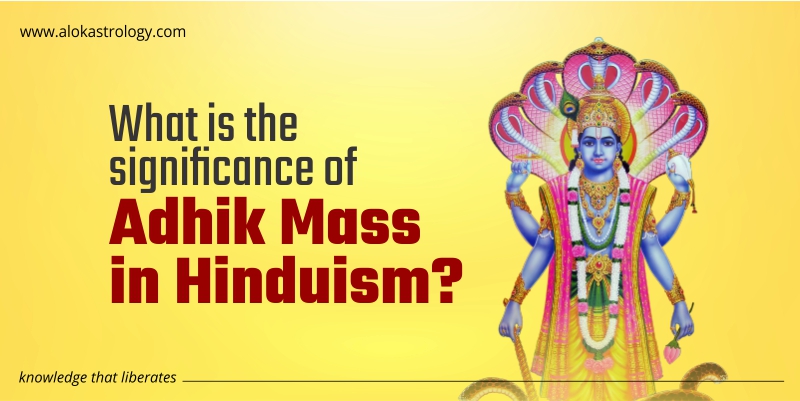The extra month, or Adhik Mass, is also called Purshottam Maas. This is a month added to the Hindu calendar so that the Lunar calendar and the Solar calendar will match up. Every 3 years, one extra month duration is added to the Lunar Calendar. This is done to make the Solar Calendar and the Lunar Calendar match.
Know about Adhik Maas in Hinduism? Get an online astrology consultation by the world-renowned Astrologer Mr. Alok Khandelwal.
Meaning of Adhik Maas
There are no festivities observed during Adhik Maas, commonly known as the Mal Maas, or unlucky month. In the Lunar Calendar, one god is in charge of each month. When sages figured out this extra month, no god or goddess was ready to claim it. Lord Vishnu was asked, and he agreed right away that this extra month should be named after him. This is why it is also called Purshottam Maas.
While no new or particularly good deeds are undertaken during this month, several religious observances are held to appease Lord Vishnu.
The Vedic Purana says that our souls are made of water, air, earth, fire, and the sky. Meditation and Yoga help bring these parts of the body back into balance. Performing religious rituals for a whole month has been shown to purify the soul and fortify the body. Adhik Month, which occurs every three years, is a time of cleansing and revitalization. Kundali Dosha is also said to be fixed if you keep doing it religiously for a month.
People are supposed to get rid of all their bad actions during this month by focusing on self-appraisal, self-cleansing, self-evaluation, reflection, and soul-cleansing. To make up for your sins during Mal Maas, you should give to charity, help the poor, and feed animals. People should go without eating and pray to Lord Vishnu.
Homas and yajna are done by people. Aside from this, Svadhyaya, or the study of religious texts on one’s own, is done. This month is a good time to read the Shrimad Bhagwad Puran or Shri Vishnu Puran. People do a lot of religious things during this month, which makes it a very spiritual time. This leads to purity and change in people’s lives for the better.
Adhik Maas has several positive effects.
- Keeping a strict fast during Mal Maas is equated to performing hundreds of Yajnas and Homas.
- Giving and helping others during this time will bring you more money and luck.
- When you think about the sins you did during this time, it cleans your heart and gets rid of the sins.
- To counteract the unfavorable planetary influences now is the time to do the Grah Dosh Nivaran Puja.
- During this time, if you do Vishnu Puja, chant Vishnu Mantras, to get rid of all your sins.
What does the science say about Ahik Maas?
In Hinduism, nothing happens without good scientific reason. Adhi Maas is also based on science. As previously said, it is possible to align the Solar and Lunar Calendars; let us now see how!
The lunar calendar has 354 days, while the solar calendar has 365 days and 6 hours. Thus, approximately 11 hours separate the Solar and Lunar calendars. Since the Lunar Calendar deviates from the Gregorian one by around 11 days every three years, a leap month called an Adhik Maas (also known as the Purshottam Maas, after one of the names of Lord Vishnu) is added to the cycle.
The scientific reason for Adhik Maas
It takes the Moon 27.3 days to go around the Earth once. While the Earth’s trip around the Sun takes 365.25 days. Adhik Maas is an addition to the Lunar calendar since it has 32.5 months instead of the Solar calendar’s 12. Indian numerology says that there are 354 days in a Lunar year. The solar year, in comparison, is 365 days long, despite deviations of 11 days. It has grown by one month in three years. This means that Adhik Maas keeps the distance between the solar year and the lunar year stable.
Adhik Maas differs from other Lunar months in that it does not feature a Sankranti, which represents the Sun’s passage into a different Zodiac sign. During Adhik Maas, the Sun neither changes Rashi nor moves through one astrological sign to another nor does it experience Sankranti.
Read Also:- What happens when Ketu is in the 1st house?
